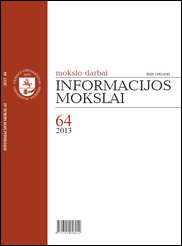Nacionalinio identiteto raiškos socialiniuose tinkluose
THE FORMS OF NATIONAL IDENTITY IN SOCIAL NETWORKS
Author(s): Daiva SiudikienėSubject(s): Social Sciences
Published by: Vilniaus Universiteto Leidykla
Summary/Abstract: When investigating the culture of virtuality, one of the main problems is the identity of the contemporary media users and the factors influencing the formation of their identities. In a traditional society, the identity was formatted by the traditional social institutions such as family, church, nation, etc. The nation was defined as a culturally homogenized population living in a defined territory, distinguished by collective cultural identity, common values, traditions, worldview, the same language and history. Today, the individuals live in the environment enriched by the media, and their daily routines are closely related with the practices of media usage. Formation of the identity is now a more personal routine, meanwhile the influence of traditional social institutions and institutional values decreases. In the globalised world the identity as a whole is no more an inherited thing; rather, it is based on the creativity of a person and his choices. Traditionally defined as fundamental, national identity becomes a disputable symbolic capital like the other types of social identity. This new emerging reality forms a multitude of issues. Significant problems are related to the relationship between the supra-national and the sub-national spheres. Is the national indentity still important for the young media users in the era of globalisation, mediatization, and individualization? How the young media users define themselves in the globalised media environment? How the young media users cohere the elements of both local and cosmopolitan culture? What new boundaries develop among social, cultural, and ethnic groupings? The aim of this paper is to discuss the emerging new forms of national identity of the Lithuanian youth as a new media generation. Results of the investigation show that the national identity is under deep consideration among the young media users. It is clear that the national identity should gain more modern forms and be supported by new values in the contemporary dynamic world where the cosmopolitan values correspond to the lifestyles of the young media users much better than do traditional institutional values.
Journal: Informacijos mokslai
- Issue Year: 2013
- Issue No: 64
- Page Range: 19-34
- Page Count: 16
- Language: Lithuanian

